Nigel Bird's Blog, page 23
August 3, 2018
In Loco Parentis

In Loco Parentis is a story I'm very proud of. Having had a makeover and an edit, it is now available as a pre-order from the wonderful All Due Respect and will be released on August 17th.
I know that some of you have read this already and I'm very grateful for that. If you're in that camp and you enjoyed it, I'd appreciate it if you could help spread the word in some way - a tweet, a mention during one of your book conversations with friends, a Facebook post. You know the kind of thing.
If you've not been there before and need a read that might challenge, shock and entertain, then this could well be it. Here's the nutshell it's wrapped up in:
Joe Campion is the kind of teacher any child would want for their class. He’s also the kind of teacher who never turns down a drink, a smoke or a lay.
When Joe finds out some of his students are suffering abuse, he doesn’t trust the system to take care of it. His impulsive nature, dedication to his pupils and love of women lead him on a long, strange and bloody trip.
Praise for IN LOCO PARENTIS:
“In Loco Parentis is terrific, start to finish.” —Charlie Stella, author of Tommy Red
“Beautiful, painful and excruciatingly brilliant writing.” —McDroll, crime fiction author
“A unique voice that sets the writing head and shoulders above and apart.” —Anonymous-9, author of Hard Bite and Bite Harder
“The writing is beautiful and spare and by the end I felt a cathartic relief. This story is a roller coaster ride of emotion, but a ride well worth taking.” —Mike Miner, author of Hurt Hawks
I'm delighted that All Due Respect have put this out and hope that I'll be able to return their faith by helping to get word out and generate a few sales. It's a small publisher, but isn't it the small publishers that really help keep the world of books interesting? I've seen enough of them fold in recent years to know that it's a perilous business. It's a vital one, nonetheless. One we all need to keep in mind every so often. So, if In Loco Parentis isn't to your taste, I'd be just as pleased if you went along to their site and chose another of their titles (there's enough variety in there for any crime fiction and noir fan) to take home or download to your device. Go check them out.
And if you'd like a copy of In Loco Parentis, you can buy one at:
Amazon US
Amazon UK
Amazon Canada
Barnes and Noble
Kobo
Waterstones
If you don't want to pay, but fancy a read, why not order a copy for your local library? That works, too.
Big thanks are due to Chris Rhatigan for putting the whole thing together and JT Lindroos for a beautiful cover. Cheers guys.
Published on August 03, 2018 08:21
August 1, 2018
Dancing With Myself: RAY CLARK
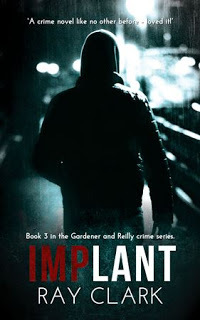 Implant
ImplantI love stories. There are those who would claim I have to say that, otherwise I’m in the wrong game. But I genuinely do: either, writing, reading, telling or listening to them.
There’s nothing better than putting your feet up in front of the fire on a winter’s night, a bottle of wine by your side and a book at your disposal. Outside, the blistering rain hits the windows, draughts creep around the building, with unexpected sounds giving the house a life of its own. Inside, the television is off, the stereo is low, the room is warm, and you’re alone with your book – a mood of tranquility pervades.
I have a number of like-minded friends and I was recently given the chance to join three of them for a weekend break, deep in the heart of The Yorkshire Dales. The log cabin nestled in the woods with a large lake at the end of the garden. Given that it was summer, the weather was agreeable, so we took advantage of the patio complete with barbeque, chimnea and halogen lights. All we needed to provide was alcohol and food.
My three friends consisted of my webmaster, Iain, and his wife, Julie, and a friend of mine called Emma. What usually happens with people in such situations is they eventually start relating campfire stories, which are almost always ghost stories. Before long no one wants to leave the table or part company from the rest in case something is lurking in the darkened recesses. But it didn’t take that turn. It almost became an impromptu interview, when each of them tried to think of a question I have never been asked.
I was curious because I thought they had set themselves a real task. Not so, Julie opened the questions with an absolute beauty:
“If you could be one of your characters for a day, who would it be, and why?”
“That’s a right question,” I replied, taking a sip of wine, confirming without doubt that I had never been asked that one before.
“But are you going to answer it?” she added, cheekily, thinking she had me.
I had to think about it. I was pleased it wasn’t a live radio interview. After I’d replenished everyone’s glasses, here’s what I said:
“I think it would have to be Luther Grant.”
“Great name,” replied Emma, “so tell us who he is.”
“It was a character I featured in a short story called, Lost and Found, eventually published as part of a collection entitled A Devil’s Dozen by Double Dragon.
“You guys all know me well enough by now to know I’ve always been a big fan of the mysterious: stories with twist endings that surprise you because you never saw it coming. Back in the 60’s, there was no shortage of that kind of stuff on the TV. I remember The Outer Limits. It used to open with the line ‘Do not adjust your TV set…’ That gripped me. Alfred Hitchcock had his own series. Boris Karloff presented something called The Veil, and Out Of This World, the latter being a series I have never laid my hands on.
“Don’t think I remember that one,” said Iain, “the others I do, and what about The Twilight Zone.”
“I was just coming to that – my all-time favourite. I think Rod Serling wrote some of the stories and hand-picked others. I have so much respect for that level of imagination. My story all started from a conversation I once had with a colleague. I told him I was collecting all the episodes on DVD. He said to me, ‘Do you know, I’ve seen loads of them, and never seen the same one twice.’ Neither have I, I thought…
I even gave my story a Twilight Zone opening:
“Witness Luther Grant, a loner, 61 years of age. He has a moderate inheritance and a care free life, most of which he’s spent collecting things he holds dear, much as we all do. At present, he’s testing his knowledge to its limit on America’s most popular game show. Luther has no family and no one he would define as close. But he does have a strong will and a very sharp mind. He’s also very determined. A trait that’s going to lead him into unfamiliar territory…”
“Lost & Found paid homage to Rod Serling, and his series. So, to answer your question, I would love to be Luther Grant, because in that story he was given something that every film buff, or author, or even admirer of that kind of fiction or TV – the trip of a lifetime. I might even be prepared to settle for what happened to him…”
“Which was?” asked Emma.
“I could tell you but I’d have to kill you.”
“In other words, buy the book.”
We all laughed at that reply.
Little time passed before Iain decided to ask his, and what he basically did was flip the previous question on its head.
“Which character would you not want to be?”
Another good question.
“Most of them,” I laughed. When you think that I write either crime fiction or horror you wouldn’t want to be in many of their shoes.
“The quick answer would be, D.I. Gardener: using my real life friend who is a D.I. in the murder squad in North Yorkshire as an example. He sees and deals with things I can only experience in my worst nightmares – and then write about. Strangely enough, that’s what he calls me, his worst nightmare. Every time he sees an email from me in his inbox he runs a mile and hides for an hour or two.
“The correct answer would be a lady called Sonia Knight from the upcoming IMP series book, Implant. There are definitely two very intense horrific scenes that fall into the scary category. They instill a sense of fear in the creeping-dread-of-what-is-about-to-happen sense. Both victims are isolated but they are treated in very different ways. With one, it’s a long drawn out affair in which the victim is held captive, and being forced – in a unique way – to part with information.
The other is from a scene set in the waiting room of a small country railway station. I take quite a bit of time throughout the novel to explain the gentle, rural setting where life is lived at a slower pace, with a serene, small-town, yesteryear feeling. And then, suddenly, out of nowhere, I describe what I believe to be an extremely spine tingling situation that the police are faced with. All along, you instinctively know that no matter what they do – or attempt to do – things are going to end very badly for the victim. Hopefully, the rising panic the scene invokes causes a sense of fright in the dreaded anticipation of what is coming.”
“There’s something wrong with you,” said Emma.
“Tell me something I don’t know, but you all knew that before you came here,” I replied. “Even while I was writing it I could see and sense it all perfectly, and despite what I was doing, and the fact that Iwas also starting to inwardly feel uncomfortable, I couldn’t stop myself. I wanted to make sure that everyone who reads that scene feels as I did – or maybe even as stressed out as the victim.”
“See what I mean,” said Emma, to the rest of them.
She opened a new bottle of wine while I threw a few more logs on the chimnea. Once she’d filled everyone’s glass she asked her question.
“With that in mind, where on Earth do you come up with your ideas for disposing of people?”
What could I say? Yet another cracking question, and one I genuinely cannot answer in all honesty.
One of the biggest influences on my writing is a man called Graham Masterton, the author of some really excellent horror novels like Mirror, Night Warriors, Black Angel, The Burning and a whole host of others. For me, it all started with The Manitou: a story about the re-birth of a Native American Medicine Man. It was the location for the re-birth that blew my mind – in someone else’s body! It was full of myths and legends, and Masterton was weaving fact and fiction together quite seamlessly.
One of Masterton’s un-nerving talents is the ability to dispose of his victims in the most horrendous ways. The darkest, visually inventive scene I ever read, happened to a victim in a book called The Doorkeepers, who was connected to something called The Holy Harp. Believe me you do not want to be in that contraption. I found myself influenced by that scene when I wrote Sonia Knight’s demise. I think I was trying to outdo him.
So there we have it, the weekend finally ended with someone asking a question that I had real difficulty in answering.
Implant is available to pre-order now here in the UK (only 99p) and here in the US (only 99c).
Published on August 01, 2018 08:43
July 27, 2018
One Man's Opinion: THE HAND by GEORGE SIMENON
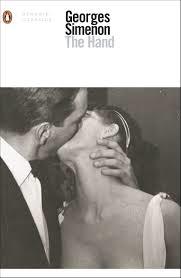
Now, here's a rare thing. A Georges Simenon book that I didn't thoroughly enjoy.
The Hand (US) tells the tale of a successful, but rather dull, attorney in Connecticut, Donald Dodds. While attending a swish party, he walks into a bathroom and finds best friend, Ray Sanders, having sex with the host's wife. Donald turns to drink and there's an uncomfortable journey home as Donald, Ray and their wives battle against a huge snow storm.
Eventually, the snow gets the better of them. They leave the car and return to the Donald's house. Upon arrival, they realise Ray has disappeared. Donald does the noble thing and says he's going to go out and search, but instead of doing so, he sits in his barn and smokes a lot of cigarettes.
Donald is now left with his own wife and Mona Sanders and as time goes on, he becomes increasingly distracted by Mona's free and easy way of being. He begins to obsess about her and it's only his staid attitude to life that prevents him from taking action.
As things progress, Donald unravels fairly quickly. The guilt he feels for not helping out his friend consumes him, as does his desire for Mona. His life spins on a sixpence and he no longer feels rooted to the person he has always been or connected to the wife who has been so loyal and helpful to him over the years.
The ingredients of a great story are all here - guilt, cover-ups, sexual tension, mid-life crisis, a claustrophobic setting and a police presence - yet it didn't work for me.
I was aware that we weren't going to get on from the beginning.
The novel is told in the first person, which should work, only Donald's voice isn't a smooth one. Far too many times, he alludes to what has gone wrong without getting to the point. He begins sentences on a regular basis and finishes with the dreaded ellipsis (not something I like to be overused) and I assume this is to build some level of tension in the piece. Instead, it made me frustrated and became irritating. Before long, Donald had become difficult company.
The essential premise of Donald's guilt caused by him leaving his friend to an assumed death simply didn't work for me. He chastises himself for killing Ray, yet he has done nothing of the sort. The fact that he wanted his friend to be dead isn't a strong enough driver for a life to fall apart, at least from my perspective.
In terms of any relationship to a book like Crime and Punishment, the novels are far apart. Instead of getting to see a human being slowly eating away at themselves, we're far too aware of Donald's feelings from the beginning. He tells us from the off that things have changed beyond recognition. Having him colour in the pictures of his journey when he's already shown us the outline takes a good deal of the intrigue and involvement away.
The sexual tensions are all easy to understand, yet they rarely raise beyond a simmer and don't really feel strong enough to tighten the noose around Donald's old life.
A genuinely interesting element of police involvement is far too quickly snuffed out, in my opinion. I'm sure this was deliberate, but the strand of tension was thrown away without a revisit and the story lost a little because of this.
In terms of the climax, it's all been written in the stars from an early stage. There's no surprise in the conclusion, nor in the manner of it's happening. Because I didn't really care much for Donald, it didn't carry much weight and I closed the book without feeling I'd ever been emotionally engaged.
On the positive side, I did find myself enjoying the devil-may-care attitude of the protagonist as he kicked against society and his own rigid sensibilities.
I also wondered about that opening and the sex in the bathroom. The moment feels autobiographical for some reason, as if Simenon's working something through. That element of the book raised my curiosity, but not enough to save the day.
It's not a terrible book, but I don't think it's a great one either. It's worth a read and if you enjoy psychological reads that speak of the hollowness of existence, there's something in it for you.
And if I've missed the point, am way off the mark, let me know. What is it that I'm missing, here? Would the historical context of make it a ground-breaker in some way? I'd really like to find a new perspective.
Published on July 27, 2018 00:08
July 22, 2018
One Man's Opinion: UNLOADED 2: MORE CRIME WRITERS WRITING WITHOUT GUNS
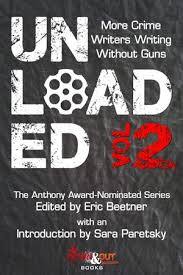
Unloaded 2 (US) provides a feast of reading in the form of a nicely weighted collection of short stories.
In turn we visit:
a forgery story and a boy who saves Christmas.
a primate escaping from the zoo who spots a hedge cutter and fantasises about chopping off the mean giraffe's tail.
an abused wife whose husband likes to soak in bubbles.
a boxer reflecting on scam in a casino and a hooker who hits hard.
a brother who likes to play hide-and-seek can never be forgotten.
the search for a missing cat which reveals more than fur and paws.
money collectors.
revenge and tattoos.
a baby needing a new home.
prison killings.
the mystery of a soccer team's suicides.
the writer who gives robots their personalities.
a father attempting to reconnect with his disabled son.
a truly amazing disappearing trick.
a first night as a punk rocker.
a man and his lover waiting for her husband to come home.
a lighthouse with a gruesome past.
a restaurant critic serving up a meal of his own.
a cop straying from the straight and narrow.
a prison nightmare with remote control planes.
and, finally, a story with guns.
The range of styles and voices is broad, but they have in common quality writing and the ability to forge a world within only a few pages.
As with any anthology, I have my own favourites, but I think it would do you no favours to name them here. Instead, I'd urge you to read this yourself and pick your own. And if you really want my faves, you can always ask (one or two picks might surprise).
My guarantee is that you're in for a treat with this collection. There are some great twists and turns, some really powerful emotions, genuinely nail-biting journeys and enough swift blows to keep you interested throughout.
The final piece underlines why gun law needs to be seriously re-considered. It's a work of non-fiction that ties the project up perfectly.
Unloaded 2 proves beyond doubt that guns aren't necessary to create amazing crime fiction. It delivers enough of the starters, the main courses, desserts and drinks for even the most voracious reader to have their fill.
Published on July 22, 2018 02:22
July 19, 2018
One Man's Opinion: THE CYCLIST by ANTHONY NEIL SMITH
 The Cyclist
The CyclistThis was his penance: The Cleaver was his Marley, except every day instead of just Christmas.
Judd didn't have what it took to make it as a Navy SEAL. Not only did he fail in his attempt to take the grade, he almost took out his infamous trainer, The Cleaver, in the process by shooting him in the legs and chest during a training exercise.
Now Judd is full of guilt. He's cut off ties with his father, hates his civilian job and is constantly haunted by The Cleaver who is now a drunken shadow of his former self and turns up like a bad cent whenever the sun goes down.
The only things that keep him going are hard, fast and dangerous cycling and the time he spends video messaging a rather cute Scottish lass called Cat. The cycling's all about getting away from everything and has the added bonus of the possibility of suicide by pedaling. Cat, on the other hand, offers something like hope. The chance that his life might not be over, after all.
When Cat suggests that Judd go over to Scotland for a cycling holiday, it's too good an offer for him to resist. He jacks in his job, cuts the physical ties to Minnesota and sneaks away from his conscience-pricking war-vet millstone while he's not paying attention.
What follows is difficult to sum up without spoiling things for you when it's your turn. Suffice to say, Cat isn't everything Judd expected. Her bike is barely fit for the road and she can't ride for toffee. More confusingly, she's uninterested in a physical relationship with Judd and plies him with enough beer and whisky to make sure that sex is out of the question. There's also a sticky issue of her other boyfriend, a rather disturbed young man who is sicker than rabies.
Cleaver, left at home with little left to fill his time now Judd has gone, smells a rat. He fears Judd might be another in a long line of SEAL suicides and decides he can't let that happen. He responds in the only way he understands, with a covert operation designed to protect his fellow countryman.
In The Cyclist (US), there's plenty of action for adrenaline junkies. There are also some great observations about the little differences between Scotland and the US. The Judd/Cleaver relationship is complex and compelling and their undulating loyalties are like a journey through the Highlands themselves.
Pain equals fuel. He had a full tank.
Twists, turns, shocks and toe-curling brutality all play their part as this one free-falls with alarming pace to it's climax. A must for the fan of the action thriller, a no-go area for the faint-hearted.
A smashing summer read.
Published on July 19, 2018 07:20
June 7, 2018
One Man's Opinion: WAIT UNTIL SPRING BANDINI by JOHN FANTE

Arturo Bandini is doomed. He’s doomed for so many reasons that it would be painful to list them all. Suffice to say he’s living in extreme poverty, his father is a brute, the love of his life looks down on him from a great height and he’s stricken by the religious fervour of his mother.
Wait Until Spring Bandini (US)offers a series of glimpses into the Bandini household. There’s not a great deal of fun to be had. Mrs Bandini is constantly begging the local storekeeper to sell her essentials on the slate. The cold is intense. Head of house, Svevo, is about to disappear. Winter is a hell to survive, what with Christmas being the property of the rich and the hard weather bringing to a close all sports. What else is there for a child to do but dream and get into trouble? And Arturo does plenty of both.
It’s a tough read in many ways. The downturns in fortune are endless and each carries more weight than the one that went before. No sooner is Arturo finding a glimmer of hope to cling to than the world cuts him down to his knees. The grinding down of the family is relentless. Resistance seems futile. The book’s as dark as the December nights it describes.
If that’s all correct, then what on earth would anyone want to read the damned book for?
Among all of the terrible happenings are moments of beauty. There are passages of sublime description. The internal workings cut deep and are vivid in their bleakness. There are crazy laugh-out-loud moments and descriptions of life that expose the motivations of the central characters in a way that is brutal and yet somehow tender.
The vignettes offered are each gripping in their own way. Mealtimes. The stealing of money to visit the cinema. The classroom. The storekeeper’s miserly spirit. The mother’s intense faith and inevitable depression. The romantic Christmas gift. The Christmas banquet. The new shoes. The brotherly scraps. The rich lover. The examinations of that it is to be an Italian in America.
These stories cling together to form a book that’s well worth a read. It’s almost a collection of short fiction, each tale carrying its own driving force which, when combined, creates an overall narrative that is difficult to resist.
I can’t say this was unputdownable. I put my copy away many times. The intensity could become too much and a rest and a little reflection allowed me to prepare for the next challenging instalment.
I enjoyed the world I inhabited when I was there and found lots of the passages to be delicious. That said, I’m going to lock the book away in a strong box to make sure its ghosts can’t seep out into my world and contaminate the things I hold dear.
Published on June 07, 2018 11:33
May 18, 2018
One Man's Opinion: SUNK COSTS by PRESTON LANG
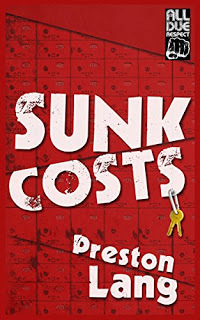
Here’s another great read from All Due Respect books.Their latest, Sunk Costs (US), tells the tale of a young drifter who arrives into town and picks up a ride with from an attractive woman. Things are a little too good to be true and an explosive turn leads Dan into making a deal. All he has to do is to find a key in the office where the lady used to work. Sounds simple enough, only it really isn’t. There’s another woman, Kate, after that same key. Kate works in the office and realises that there may be riches to be had if they can get hold of it. The situation spirals out of control as the prize continually and tantalisingly slips out of reach at every turn. Dan’s street-smarts and con-artistry are put to the test as the danger level rises enough to swamp him.Tightly written, punchy and engaging from the start, this is a low-life adventure that you won’t want to miss. Thoroughly entertaining.
Published on May 18, 2018 05:18
May 15, 2018
BATTLEFIELDS
It’s quiet without you.
Tidy, now you’ve gone.
There’s too much space.
Enough room to swing that cat of yours.
Stillness drips from walls
pooling into seas of silent nothing.
Ghosts tease me into searching shadows
and all the you-sized spaces.
The bathroom’s free, the chairs all mine
and I can surf the TV with reckless abandon.
I write BLISS in the steamy mirror
and rub it out before the final S is drawn.
Tomorrow I’ll blast out talk shows,
sprinkle crumbs on the carpet
and pile clothes in random places.
I’ll leave the cap off the toothpaste,
forget to flush the toilet
and miss the bin with every shot.
My shoes will live separate lives at the back door
while bikes stand rusting in the rain.
Until you return,
I will fill this world with chaos
eat with my fingers and leave the lights on
so you can find the way home.
Tidy, now you’ve gone.
There’s too much space.
Enough room to swing that cat of yours.
Stillness drips from walls
pooling into seas of silent nothing.
Ghosts tease me into searching shadows
and all the you-sized spaces.
The bathroom’s free, the chairs all mine
and I can surf the TV with reckless abandon.
I write BLISS in the steamy mirror
and rub it out before the final S is drawn.
Tomorrow I’ll blast out talk shows,
sprinkle crumbs on the carpet
and pile clothes in random places.
I’ll leave the cap off the toothpaste,
forget to flush the toilet
and miss the bin with every shot.
My shoes will live separate lives at the back door
while bikes stand rusting in the rain.
Until you return,
I will fill this world with chaos
eat with my fingers and leave the lights on
so you can find the way home.
Published on May 15, 2018 15:36
May 12, 2018
One Man's Opinion: LADY KILLER by ED MCBAIN
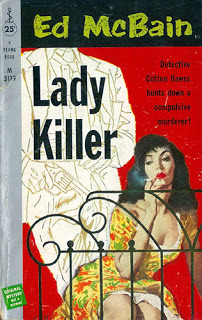
Meyer thought he would die in a way unbefitting a heroic cop. He would die of heat prostration, and the obits would simply say COP FLOPS. Or perhaps, if the news was headlined in Variety, SOPPY COP DROPS.
‘How do you like this Variety headline announcing my death by heat prostration?’ he said to Carella as they entered another hockshop. ‘Soppy Cop Drops.’
‘That’s pretty good,’ Carella said. ‘How about mine?’
‘In Variety?’
‘Sure.’
‘Let me hear it.’
‘SOPPY WOP COP DROPS.’
Lady Killer has a sense of urgency from the off. A young boy delivers a letter to the police desk.
‘I will kill The Lady tonight at 8. What can you do about it?’
The words are made from letters clipped from newspaper. It could be a hoax. The detectives of the 87th can’t afford to treat it that way and have to give it their full attention. If the letter is telling the truth, they have a day to solve the case. And so the pressure begins.
As is often the case in the series, the weather in the city is extreme. The tarmac on the roads is melting and people are desperate to find some relief from the heat. McBain does his usual wonderful job creating the picture and the temperature features as strongly as the characters themselves and would be enough to get the reader to open a window even in the winter months.
The plot sees an investigation in which no stone is unturned. The lab examines the letter. The paper on which it is made is identified and tracked down. This takes the amorous Cotton Hawes to a bookshop in which he manages to fall in love. Boys dressed like the delivery boy are collected from street corners. Artist’s impressions are drawn. Every effort is made to identify anyone known as Lady and this takes us from saunas to La Via De Putas to the showy apartment of a musical star. No lead is strong enough and the detectives become anxious about the ticking clock.
In the midst of their frustration, we meet the author of the threat. He’s watching the detectives through a pair of binoculars that will later give the team more clues to go on. We discover that the threat is no idle one and that the motivation behind the letter is to give the police a chance to stop him from committing the serious crime he has planned. He’s going to leave a trail of clues that he feels should be easy to solve. Unfortunately, the detectives struggle to get onto his warped wavelength.
The pace starts well and builds nicely to the exhilarating climax and another really classy read.
A couple of things stand out to me in this one. The first is that there is only the one crime being investigated. That’s unusual in my experience to date. It’s often the weaving of different cases that helps to keep the books moving forward with the suspense I enjoy. It also means that the books usually have a range of tones and flavours that provide excellent contrast and variety to appreciate.
Lady Killer doesn’t suffer at all for having only a single investigation underway. There’s still a great range of characters to get to know and with Cotton Hawes at the fore, we have another opportunity to get inside his head.
If there’s a downside to this one, it’s a minor one. There’s something about the ending that left me a tad disappointed. It was nothing I can’t get over, yet it wasn’t as satisfying as I had hoped. I’d happily take opinions on that to see if you can persuade me otherwise. Let me know if you have the time. And is there anyone else out there who thinks the title may be referring more to Hawes that anyone else? If there is, same goes.
Even with that minor point, it’s still a five-star read to my mind and I already have the next one lined up for when I need a reading lift.
Published on May 12, 2018 11:45
April 12, 2018
Toe Six Press
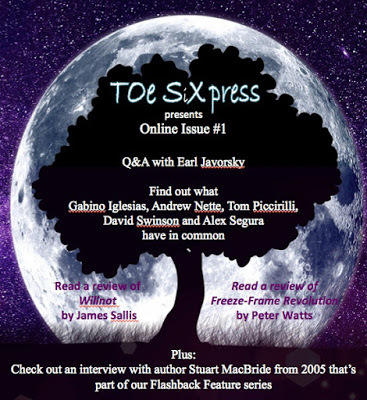 Toe Six
Toe SixThings go in cycles. Come at you in waves. Here's something new that'll sweep you off your feet. Authors and readers, you should really check this out.
I'm only here to make the introductions.
Something's afoot. Meet Toe Six Press.
Published on April 12, 2018 13:04



